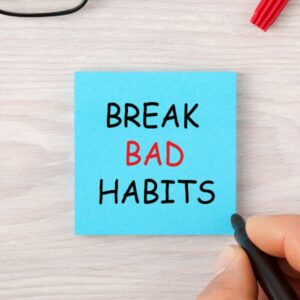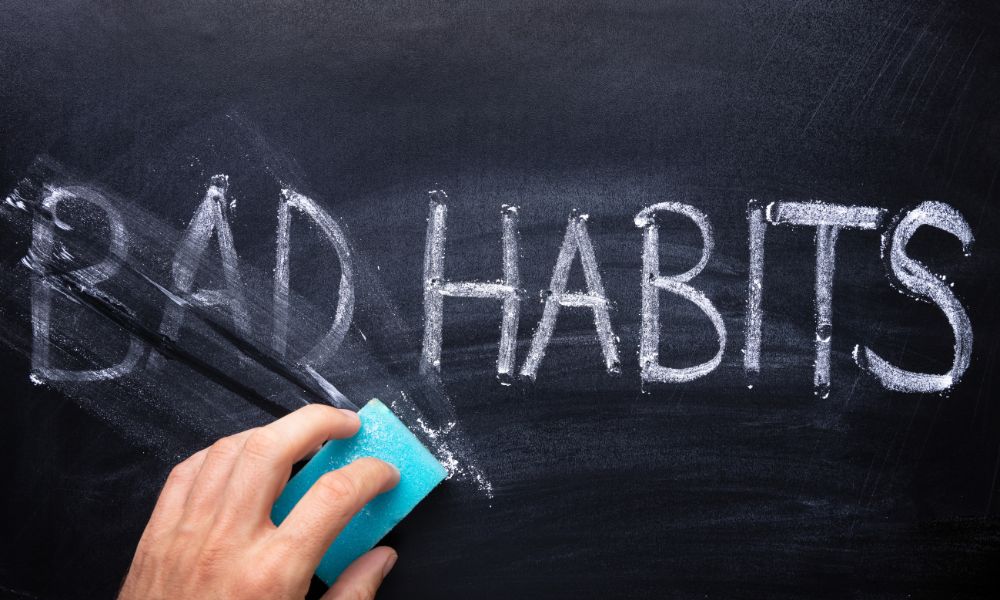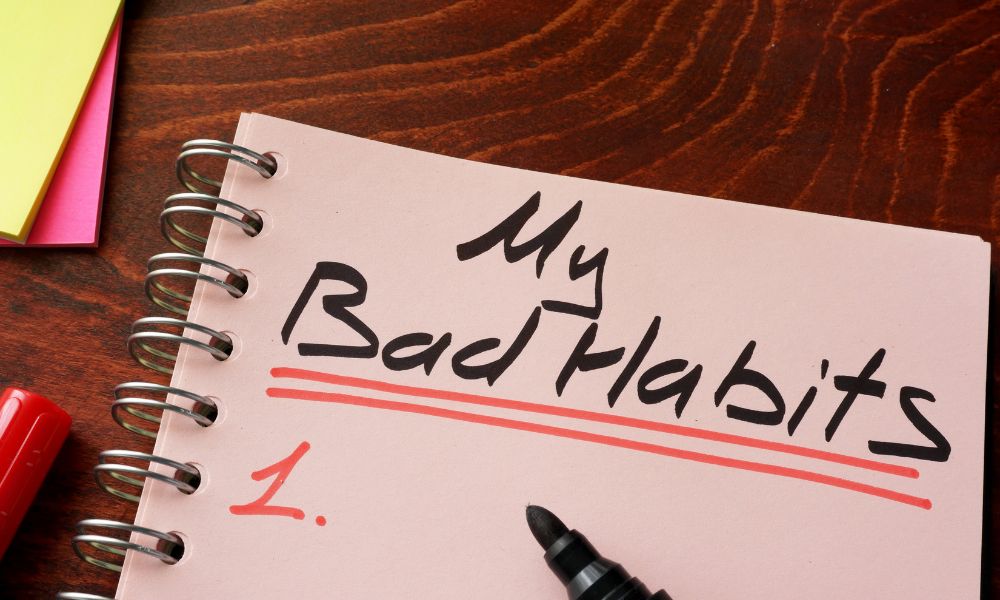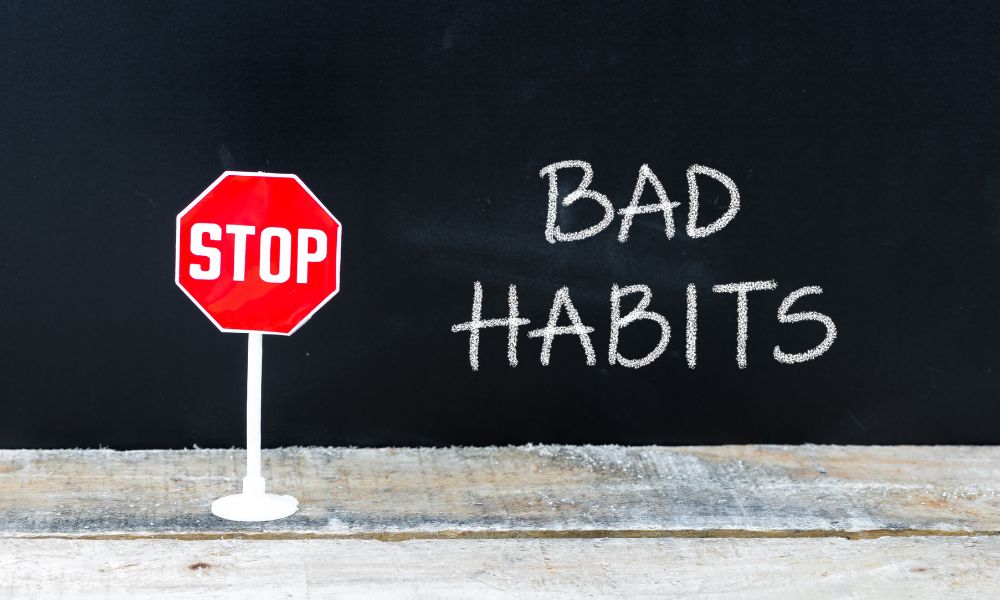
18 Feb 5 Ways to Break Bad Habits
5 WAYS TO BREAK BAD HABITS
(and stay good at it!)

5 Ways to Break Bad Habits
We all have bad habits that we’d like to break, but it can be difficult to know where to start. It’s easy to get overwhelmed when you think of all the small steps and changes you must make to break a bad habit.
But don’t worry, it is possible! All you need is dedication and conscious effort. You can successfully break those unhealthy patterns with a few simple steps.
Are you ready to get rid of the bad habits holding you back?
Let’s begin!
1. Remove anything that triggers bad habits.
Watch for cues that may inspire you to spiral downward into bad habits.
It can be difficult to break free from patterns and behaviors, but it is possible. The key is understanding your triggers and learning to remove them from your life. Learn the 4 principles of behavior change.
Bad habits often develop from certain activities or even certain places. For example, if you always nibble on chips while watching TV, then the TV could be a trigger for overeating unhealthy snacks. It is a classic example of an environmental trigger that can lead to junk food consumption over healthy snacks.
Also, focus on emotional triggers that might be tucked away under expressions of anger and resentment. If you feel overwhelmed by the workload, apply minimalism to declutter your life mentally and physically.
2. Begin with the mindset.
Creating a mindset that can see the benefits of letting go of bad habits. Also, check out Carol Dweck: A Summary of Growth and Fixed Mindsets to learn about mindsets!
As humans, it’s natural to be drawn to the same habits and activities that give us pleasure and comfort. However, continuously engaging in these habits can quickly become detrimental to our health, relationships, and overall well-being. So how do we create a mindset that sees the negative side-effects of bad habits?

- Recognize your bad habit.
- Weigh the pros and cons of actions that fall within the habit.
- Take a few moments to think why you’re engaged in those actions – where are they coming from? Are they environmental influences, personal, or professional?
- Once you understand what drives you towards these behaviors, you can start building an awareness of their consequences on your life.
- This also helps identify external triggers, which can help reduce cravings in the future.
- You can break unhealthy routines by replacing them with something healthier.
Next, practice self-compassion to break free from old patterns or behavior. Self-discipline develops and unfolds better when you acknowledge tiny accomplishments.
3. Prepare yourself for less engagement with the bad habit.
Restrict the future choices that make you stay away from bad habits.
Staying in the present is essential, as is planning for the future. With a bit of effort, you can keep these bad habits away for good.
Based on the previous step, you can identify the trigger as environmental, personal, professional, cultural, or any other tag you deem fit. Then, prepare so that those bad habits don’t return soon.
Consider the following scenarios as examples:
- If you have an unhealthy snacking habit, keep healthy snacks when cravings hit.
- Have a clean environment if you get distracted by clutter (physical space can have a drastic effect on physical, mental, and emotional health)
- Submit your work on time by assigning time slots dedicated to the tasks.
Stay focused on the end goal and intention to make sure everything runs smoothly. Remember that balance is key, so don’t give in to toxic positivity or over-productivity.
4. Ask for help and hold yourself accountable.
Feel free to ask for help.
How do you ensure you’ll stay on the right track? It can often feel impossible to hold yourself accountable for breaking bad habits. But if you create a plan and stay consistent, you can regain control of your life!
1. Pick a person you trust and be honest with them about your goals.
2. Keep a daily record or tracker that you can share with your friend or loved ones.
3. Ask the person’s honest opinion – what they appreciate and what can change for the better.
4. Consider their advice and see how you can incorporate it.

For example, quitting smoking can take smaller goals, such as cutting down on the number of cigarettes every day or week. Writing these goals down will keep them on top of my mind and make them harder to ignore.
5. Steer clear of making everything perfect.
Breaking bad habits isn’t about perfection but becoming a better person.
Bad habits take a lot of time and effort to go away. While self-discipline is key, make sure to keep a check on yourself. Refrain from pursuing perfection, and you’ll find it easier to stick to a routine.
Reward yourself even if you go one day without engaging with the bad habit in question. So you could throw yourself a mini cupcake party if you avoided smoking cigarettes for the day, and so on.
Takeaway: Breaking the Bad Habits
In conclusion, it takes dedication and commitment to yourself, and a plan of action to make the change. Habits are hard to break, but a bit of planning can go a long way.
Start by understanding why the habit exists, replace it with something healthier, and reward yourself when you reach milestones. Don’t beat yourself up if you slip occasionally; keep trying until you succeed – and also check out how you can build good habits here.
References:
https://newsinhealth.nih.gov/2012/01/breaking-bad-habits
How to break up with your bad habits
https://hbr.org/2019/12/how-to-break-up-with-your-bad-habits
How a different environment may break bad habits
https://www.apa.org/monitor/jun05/habits
Craig Selinger
Latest posts by Craig Selinger (see all)
- Psychotherapy and Support Services at Cope With School NYC - April 12, 2024
- NYC Parents of Teens Support Group - April 8, 2024
- Here I Am, I Am Me: An Illustrated Guide to Mental Health - April 4, 2024


No Comments